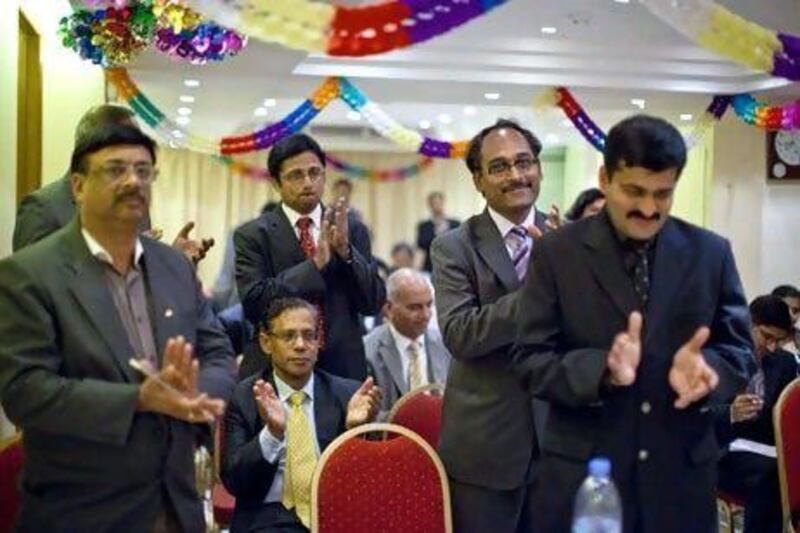"May the best speaker win."
And with that, anxious executives and aspiring middle managers prepare to step to the front of a narrow banquet hall on the second floor of an Abu Dhabi restaurant and deliver prepared speeches to a group of about 30 listeners. It is nerve-racking for many of the assembled, but that is the whole point — to master the elusive art of public speaking.
Unlike the protagonist in the Oscar favourite The King's Speech, the participants on this night will not engage in unconventional calisthenics or be encouraged to swear. It's all about practice.
According to the rules established by Toastmasters, the organisation behind this night's event, each speech must run for at least four-and-a-half minutes. Fall short or gab longer than seven-and-a-half minutes and the speaker is disqualified. At the five-minute mark, a green light will flash at the back of the room, followed by an amber warning at six minutes and a red flare at seven.
There are about 12,500 Toastmasters groups globally - 18 of them in Abu Dhabi. Each group sets its own monthly membership fees, although they typically include a one-off fee of US$16 (Dh58) to $20, plus $3 to $4.50 a month in global dues.
"It's basically for people who want to improve their communication skills," says Sujatha Parthasarathy, a regional banking executive who volunteers as president for one of the Abu Dhabi groups. "They learn by doing."
Almost any subject is fine to explore, except the big three: religion, sex and politics. Predictably, many business leaders tend to focus on the theme of success: fighting for it, achieving it, being remembered for it. One man, with dramatic flare, hid behind a cardboard tombstone and asked: "If you were to write your obituary today, how do you want to be remembered?"
Still, topics vary widely, ranging from the difference between solid and liquid soaps to a demonstration of how to bake a cake.
But the specific subject matter is irrelevant to the exercise.
"The point is, what is the purpose of that particular project and have you achieved that?" says Ms Parthasarathy.
Each meeting's "project," or task, centres on learning a specific skill such as getting to the point of a speech in an efficient but artful way, or making effective facial expressions. The wannabe baker's goal when he decided to prepare a cake? To showcase his ability to employ his body language successfully.
Tonight's event includes a couple of contests in which winners can go on to compete against regional, national and even international peers in what has been dubbed the "Olympics of oratory".
Yet for Ravi Moosad, a 33-year-old who consults with the Ministry of Finance in Abu Dhabi, there are simpler ambitions. He says he wants to beef up his public speaking skills to improve his project presentations and verbal status reports at work.
After delivering a moving speech, about how some of his personal failures were stepping stones toward success, Mr Moosad sat and listened to six other members as they provided him with feedback. They lavished plenty of praise, but also peppered him with helpful suggestions. Stop slouching your shoulders, for instance, and push out your chest to appear more confident. Another tip: Maintain eye contact with audience members even when you are trying to remember what comes next in a speech.
But there was a common thread in nearly all of the critiques, and that is what Mr Moosad says he aims to work on most.
"Adding more vocal variety," he says, showing a voice recorder where he stored all of his peers' comments. "I need to work on that."






